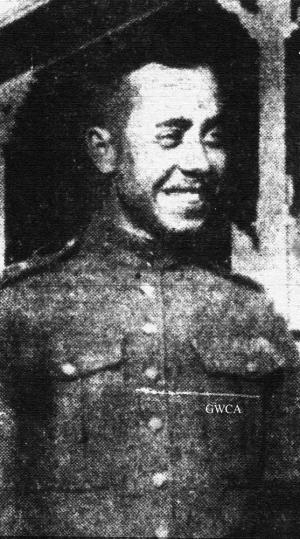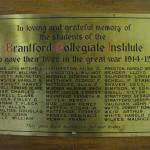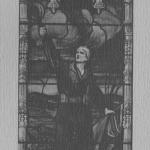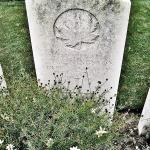Circumstances of Casualty: Killed in Action. He was instantly killed by an enemy shell that exploded in the little dugout he was occupying at the time.
Location of Unit at Time of Casualty: Vicinity of Thelus.
BX April 28, 1917
Three Homes Here Bereft by War’s Claims – Private Lawrence Wilmot Livingston, One of Four Khaki-clad Sons of Magistrate, Killed – Two Others Killed in Action
Three more Brantford homes were saddened by the receipt of telegrams from the war department at Ottawa conveying the news that Privates Lawrence Wilmot Livingston, Gordon Kenneth Wilkinson and C. Anderson had been killed in action on April 12.
It was in the signalling section of the first Brant County Battalion that “Billy” Livingston went overseas. He was only 23 years of age, and was on the staff of the Standard Bank here when he enlisted. Three brothers are also overseas, Pte. Brant Livingston, who went with an infantry battalion from Brantford, is now in an English hospital; Pte. Arthur Livingston is with the Princess Pats and Lieut. Hugh Livingston with the first Brant Battalion.
A letter was received a few days ago by Police Magistrate W.C. Livingston, his father, which had been written the day before he went into battle. In it he stated that they were going over, and if he should not return, to remember him as one little “soldier who had helped in bringing the war to an end.”
The news of Private Livingston’s death came with a deep shock to the many friends of the family. Police Magistrate and Mrs. Livingston had four boys, all of whom enlisted. Since the very beginning of the war both have taken a deep interest in patriotic work. Mrs. Livingston was largely responsible for the organization of the Woman’s Patriotic League, which forms a central organization and clearing house for all the women’s societies of the city, and from its inception to the present time she has been the indefatigable head, devoting practically all her time to causes arising out of the war. Not a soldier has left Brantford but has been remembered by the organization of which she is the capable head. She gave her four sons, knowing full well the sacrifice that she was then making and might afterwards be called to make, and she has given herself to the cause of right. With His Worship she will have the sincere sympathy of all of Brantford, and none the less of all Brantford men now at the front.
BX May 7, 1917
Pte. W. Livingston Honored in Death – Memorial Service for Fallen Hero Conducted at Brant Ave. Church
“Asleep in Jesus, blessed sleep;
From which none ever wake to weep;
A calm and undisturbed repose,
Unbroken by the blast of foes
“Asleep in Jesus, O how sweet
To be for such a slumber meet;
With holy confidence to sing
That death hath lost its venomed sting.
“Asleep in Jesus, far from thee,
Thy kindred and their graves may be;
But thine is still a blessed sleep,
From which none ever wake to weep.
Singularly prophetic and comforting to those bereaved by the cruel blast, those words of the immortal old hymn sounded last evening to all assembled in Brant Avenue Methodist church on the occasion of the memorial service for the late Pte. W. L. Livingston, killed in action at the battle of Vimy last month, until there was scarce a dry eye in the church and to all there came a wave of realization of the solemnity of death and the consolation of a reunion beyond the grave, as emphasized by the pastor, Rev. A.A. Bowers, who throughout his brief sermon spoke with visible emotion and sympathy for the loved ones so sadly bereaved.
Death Mr. Bowers pointed out in his opening words based upon the text, “It is appointed to every man to die,’ was a thing the true nature of which was known by no living mortals, for to comprehend death truly one must experience it. The mortal effects of death, we all realized bitterly at times; the breaking up of earthly relationships and the severing of worldly ties. But what death did for the liberated spirit, whither the soul took its departure and where it abode, were matters of conjecture. Yet to true Christians was vouchsafed the consolation of knowing that death while at peace with God meant the ushering of the soul into a condition of tings wherein it was to have a larger and holier life. The speaker went on to illustrate his remarks by an analysis of the etymological significance of the words “decease” and “departure,” used by Peter and Paul respectively with reference to death. The former word in the original version of the Scripture read “exodus,” or deliverance from bondage, as in the case of the chosen people; the latter, a naval term in its original use, had reference not to the voyage of the should to the harbor of eternal rest, but signified rather its embarkation upon the great and boundless sea of eternity.
The speaker went on to point out the manner in which provision against the terrors of death had been made by Christ, from the victim by the promise of redemption and a happier life to follow, and from the bereaved ones by the hope of a joyous reunion to come to the Heavenly Kingdom for all eternity. Special musical numbers were the order of the evening, Miss Jean McLennan being the soloist for the occasion.
BX May 7, 1917
Choral Memorial Service Held – On Sunday at Brant Avenue Methodist Church for Private Lawrence Wilmot Livingston
A special choral service to the memory of Private Lawrence Wilmot (Billy) Livingston was given in the Brant Ave. Methodist Church last night. The congregation, which was large, included many returned soldiers who had come to pay their tribute to the dead hero. The music, which was most impressive, was distinguished by a note of hopefulness which seemed to shine through the solemn service, and make one realized the blessedness of the life beyond. The service was fully choral and the anthems rendered were “O Come to My Heart, Lord Jesus” (Ambrose); solo by Mr. J.B. Hills; “Lead Kindly Light” (Pugh-Evans); solo by Miss Jean McLennan, “How Blest Are They” (Tchaikovsky), and “Rock of Ages” (Dudley Buck). The choir, which was about 50 strong, sang with great effect and telling fervor. The tone was of exceptional volume and purity, and the soulful expression and interpretation reached a very high standard. Special mention might be made of the Great Russian composer’s funeral anthem, “How Blest Are They, which was most impressively sung. Miss Jean McLennan was entrusted with that beautiful aria, “I know That My Redeemer Liveth,” and the clear freshness of her voice and the touch of hopeful joy that characterized her interpretation made one again realize what a great solo it is. The Rev. A.A. Bowers remarks on the task of life and the joy of life after death for a soul that has done its duty. The service, which was slightly over an hour in length, was exceedingly impressive. Mr. Clifford Higgins, who was as usual in charge of the music, played Chopin’s Prelude in E. Minor during the offering.
BX September 27, 1920
Memorial Window to Heroic Fallen Unveiled at Brant Avenue Church – Chancellor Bowles of Victoria College Officiated at Official Recognition of Nine Members of the Church Who Gave Their Lives in the Great War – A Ceremony Pregnant With Meaning
In dedication to the nine men of Brant Avenue Methodist Church who gave their lives in the Great War, a memorial window was unveiled in that church at the morning services yesterday. Rev. Chancellor Bowles of Victoria College, Toronto, gave the message of consolation to the friends of the soldiers whose memory he extolled and Major A.E. Lavelle, D.D., and Major E. Sweet both in uniform, unveiled the window. The congregation filled the church to the last pew and each one could not fail to receive, from the simple and impressive ceremony, a strong, new motive for keeping alive what Chancellor Bowles called a great and glorious memory.”
Deeply impressive and heart soothing was the whole ceremony. Rev. J.D. Fitzpatrick, the pastor of the church, was in charge and the choir gave special music, including solos by Miss Reba Force and Miss Margaret Stephen, the latter of Toronto. The military significance of the event was emphasized by the number of men attending in uniform. Besides Major Sweet and Major Lavell, places of prominence were given to Col. M.A. Colquhoun, D.S.O., C.M.G., Lieut.-Col. M.E.B. Cutcliffe, Major Jordan, Lieut. K.V. Bunnell, Lieut. Donald Waterous, Lieut. Charles Sheppard, Capt. (Dr.) Leonard Coates, Capt. Dufferin Slemin, Lieut. Fred Pinnell, Capt. Morley Verity and Sergt. James Hitchon, Nursing Sister, Captain Annie Hartley, was also present.
The Decorations
A special committee had spent much time in making the church beautiful, draping the chancel in flags and wreathing maple leaves over the window and around the memorial tablets formerly erected. Bouquets of mauve and white and pink and white asters were placed on the sill of the window.
The Sermon
Following the solemn prayer by Rev. J.D. Fitzpatrick and the choir offerings, Rev. Chancellor Bowles preached a most impressive sermon.
The dedication of the memorial, said Dr. Bowles, was promoted by instincts of love and gratitude and loyalty that sought to keep in recollection the names of those who were gone, their voices, their faces and the deeds they had done. Thoughts of them were like a benediction after prayer, for memories such as theirs soothed and elevated and enriched men’s lives and kept them in touch with the living past. Many memorials were being erected, he said, from simple tablets to costly community halls, churches and arches; yet the outward form mattered little, what counted was the appreciation and admiration of those who raised them. Every memorial was erected “Lest we forget.”
It was not likely this generation would ever see such another war, it was the grimmest and most awful thing men had ever faced; they had been overwhelmed by its terrible destruction and death. This ceremony was held to lead others to know its meanings and learn its lesson well – “Lest we forget.” Drawing his bearers to think of the many elements that entered into the cause of the war, the struggle, said the Chancellor, had written its own inner meaning. Humanity could live in safety on this earth only as a spiritual and moral force; there must be a right relationship among the nations; men had come to feel the sense of the ultimate value of what was right and what was fair. “We know what conceptions and ideals moved our boys,” Dr. Bowles went on. “They had the sense of human value. Most of them were scarcely young men, they were only boys. Life had no problems for them yet; the iron had not entered into their souls. Now they make one small portion of those who like in Flanders’ Fields. They had not lived their lives as some listening to me have almost done, they poured out the wine of youth, life’s passions; nor” he said, “will you cease to think of them as young and fair. From the many letters I read written by Victoria College students, I was struck by the cheer and the steadfastness to duty they expressed. From one I have here, written to the soldier’s mother, before the great struggle of August 8, he concluded, ‘a great triumph will take place and I shall have a part in it.’ Remember”, said the Chancellor in closing “that was the spirit that actuated them through it all.”
The Unveiling
Major Lavell and Major Sweet conducted the unveiling ceremonies, the former giving a brief address and the latter reading the names and drawing aside the Union Jack which covered the memorial window.
In beginning his remarks Major Lavell referred to Major T. Harry Jones, who had so much to do with the memorial window, but who had not lived to see the completion of the work. He said that out of the many thoughts that crowded in upon his mind there were but three he had time to express. The first was the sorrow that those present must feel who were nearest and dearest to the men whose names were on the memorial. This sorrow and perplexity at death was as old as the race. To this sorrow he had little to give but sympathy. Possibly if they would find the secret of Calvary and see our Lord’s death as victory and not defeat, they would have light and much comfort. The second was that the front line areas made a school the like of which existed nowhere else. It tested, disciplined and changed every man. They learned to know real values, what was worth retaining and what might be well given up. The third was that these brave young men having passed through this school that most of those present had not passed through, and therefore knew not, willingly faced death and died doing their duty, which to them was far preferable to mere living. Could their loved ones here not have faith in their faith and even in their sorrow and ignorance believe in the light seen by those who had fearlessly walked through the valley of the shadow?
Major Lavell quoted from Sir Arthur Currie’s message to the Canadian soldiers, delivered on March 27, 1918. How true, he said, his finals words had become and how appropriately they had been chosen for the inscription on the window: “You will not die, but will step into immortality.”
Impressively and clearly Major Sweet read the roll of those whose names were inscribed on the tablet:
Harold Staples Brewster
Alexander Finletter Brown
Hugh Dalton Livingston
Lawrence Wilmot Livingston
Joseph Howard Pinnell
Earl Pettit Pitcher
Harold Brant Preston
Frederick Stanley Schell
Egerton Vaughan
As the window was revealed and the names were called, the notes of the “Last Post” were sounded by Sergeant Beech of the Dufferin Rifles.
The committee of arrangements consisted of Mrs. R.S. Schell, Mrs. W.C. Livingston, Mrs. J.J. Vaughan, Messrs. W.S. Brewster, T.H. Preston, E. Sweet and C.S. Slemin.




